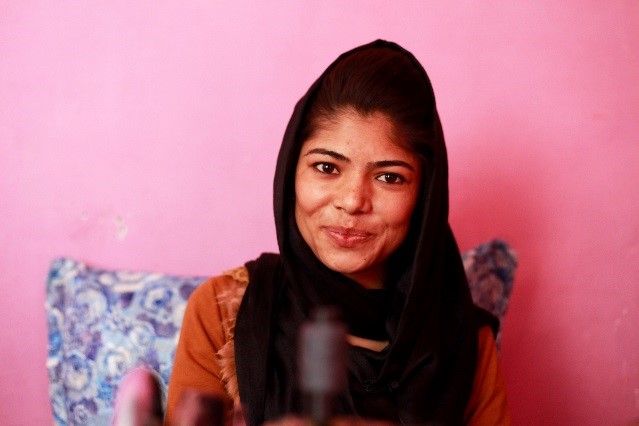Sewing her way out of poverty

Five months ago, we visited 23-year-old Nasira Haqjou to see how her tailor business was going. She then lived in an old house that was all bent and without electricity.
A lot has changed since then! When we now visit Nasira it is in her new colourful house where new carpets cover the floor and where beautiful pillows that she has been sewing herself is places along the walls. Outside there is a garden where olive trees shade the sun.
When Nasira was 3 years old she suffered from polio and became disabled. Because of her disability no one outside her family called her by her name anymore. Instead people called her offending names. In school, she was met with mistrust and the teachers didn’t expect anything of her. “It was very painful for me in those days” Nasira says. When she finally found a friend after 12 years in school she felt that the whole world had been donated to her.
Both being a woman and being disabled her conditions were least to say very difficult. Often people with disabilities are discriminated due to illiteracy and prejudices. They are being closed out from society and social contexts like school and healthcare services. That leads to severe poverty and dependence on others for their survival.
Nasira was fortunate to go to school and one day, the field supervisor of disability project of Swedish Committee for Afghanistan came to her house. “I shared all these painful memories and then I was invited to receive the ce of the project” she said. Nasira was sent on vocational courses, where she spent eight months learned tailoring.
“When I started tailoring, my life flourished and a great improvement was made in my life. I got an interest free loan from the program of disability in the Swedish committee for Afghanistan, and through this loan, I bought tailoring and sewing equipment”.
Through tailoring Nasira now runs her own business and this has lead not only to a new house but to her being able to provide for her family and to her own independence.
“In addition, I learned the art of putting henna on the hands of the brides at weddings. Believe me, now I have a lot of friends and I will be invited to every wedding party”.
Nasira is now helping other women with disabilities by engaging her as a spokesperson for the Women’s association in Balkh Province.
“I am expressing my gratitude for all who support the Swedish Committee for Afghanistan. If the Swedish Committee for Afghanistan did not support me I was not able to receive this social reputation and this economic improvement. Thousands of thanks to the Swedish committee for Afghanistan and to the Swedish people who made all of this happen”. Said Nasira.